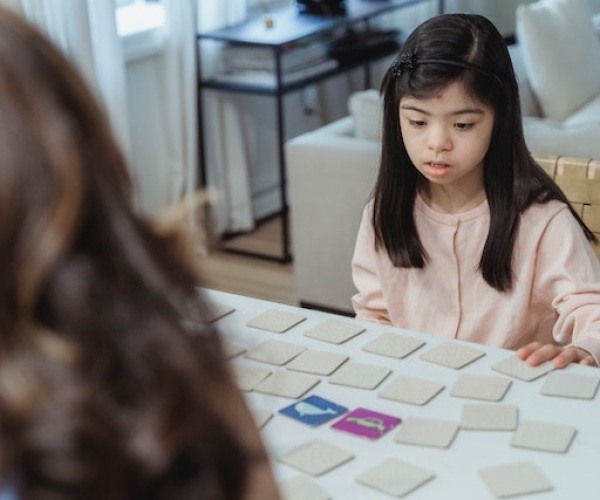How does a speech pathologist work with autism?

Speech Pathologists are often a first point of contact for families after they receive a diagnosis of Autism. Autism Spectrum Disorder (ASD) commonly results in difficulties with language and social skills which speech pathologists are experienced in treating.
Autistic children and adults frequently have challenges with reading social cues (facial expression, body language etc) and this can lead to larger challenges in navigating social relationships. When social situations become uncomfortable or awkward it can become isolating. They can frequently face misunderstanding and judgement because of their difficulties in social skills.
These difficulties can get in the way of an autistic person’s goals in school, work and building relationships with others. For autistic children it may make it more difficult to play with their friends, get along with their siblings and engage at school. It can often lead to frustration and behavioural outbursts when they can’t get their message across. It may also be frustrating for their families who are trying to understand their needs and perspectives.
What areas does a Speech Pathologist support Autistic individuals?
- Diagnosis & Assessment – Speech pathologists can support other professionals such as a paediatrician or psychologist in making a diagnosis of Autism. Speech Pathologists formally assess language, literacy, mealtimes, speech and social skills which identifies areas of strengths and areas for treatment
- Social skills – To manage social situations we need to use a lot of smaller skills at the same time. We need an understanding of body language, facial expressions, perspective taking, conversation rules, unspoken rules and spoken rules. Autistic individuals often benefit from direct teaching and practice of each of these skills. It may not be enough simply to observe other people doing these things.
- Language skills – Everyday language skills include things like making sentences, telling stories, responding to questions and asking for things (expressive language). Importantly, we need to also understand what is being said to us (receptive language). There are also more advanced language skills like understanding turns of phrase (“It’s raining cats and dogs”) or using indirect communication (“This bag is so heavy!” as a way of asking for help).
- Alternative and Augmentative Communication (AAC) – For those who are non-verbal (do not speak words) or are minimally verbal (speak a small number of words), a Speech Pathologist focuses on increasing communication skills as a whole. Speech Pathologists work holistically with autistic people and their families to find a mode of communication (speaking, writing, communication devices, Picture Exchange Communication System, key word sign etc) that best suits the individual. The goal is always to find the system that fits each individual’s skills, circumstances, and preferences for communication.
- Feeding and mealtimes – Speech pathologists have specific training in mealtime assessment and treatment. Specifically they are concerned with the structure and the movement of the mouth and throat during eating. Theywork closely with other professionals and medical practitioners to help with swallowing safety, food selectivity and mealtime independence.
- Advocacy and education – Speech Pathologists advocate for autistic individuals to be their authentic selves and so don’t aim to eliminate autistic traits like echolalia (repeating things they’ve heard) or stimming (this is a method of regulating the body). Some social behaviours, like making eye-contact, which is normal for non-autistic people, has been reported as being uncomfortable and sometimes painful for autistic individuals. Speech Pathologists respect each individual’s perspective and focus on enhancing the lives of people with social and communication challenges in ways that are most meaningful to them.
When should I start speech therapy?
In a nutshell, it is always suggested the earlier the better.
Most research shows that early intervention (birth to 7 years old) has great benefits for autistic children and is likely to have long-term effects, and rely on less intervention in the older years.
This doesn’t mean that progress cannot be achieved when the individual is older. In some areas (such as social skills) the individual needs to be more cognitively mature to work on these skills successfully.
Does speech therapy work for autistic children?
Lots of research has been done looking at the outcomes of autistic children. Research has shown that speech therapy is beneficial for autistic children in developing their play, language, speech and social skills.
If you believe yourself or your child would benefit from support with communication or social skills but you need further guidance, you might like to consider seeing one of the speech pathologists at Prosper Health Collective for some extra support. These types of problems are best dealt with sooner rather than later before they become entrenched and more difficult to overcome.
(This blog uses identify-first language (‘Autistic individual’) as opposed to person first language (‘person with Autism’) due to input from disability advocacy groups. It is acknowledged that each individual has a right to identify with the language they feel most comfortable with.)